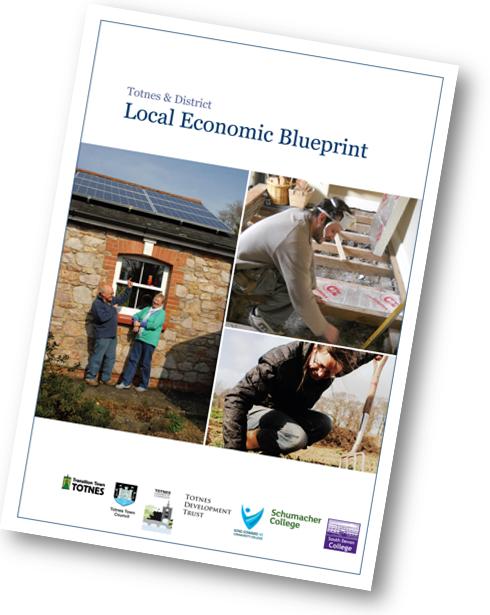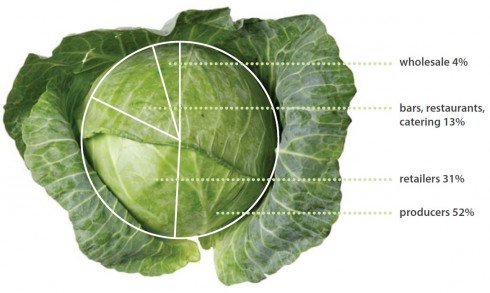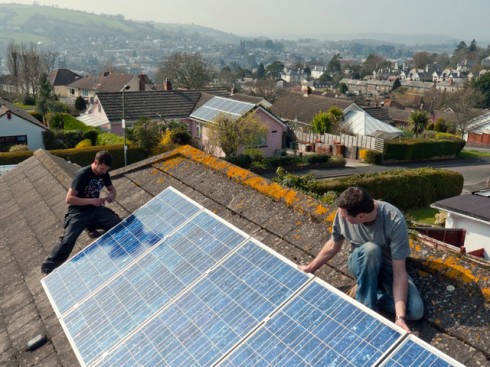28 Mar 2013
Local Economic Blueprint highlights potential of community resilience
 Today sees the publication of what may well turn out to be one of the most important documents yet produced by a Transition initiative. Over the next few weeks we will be returning to it, to hear a range of perspectives on it, and hope it will generate debate and discussion. The document is the ‘Totnes & District Local Economic Blueprint‘, and you can download it for free here. The Blueprint is the first attempt that I am aware of to map in detail a local economy and to put a value on the potential benefits of an increased degree of localisation. If you like, it identifies “the size of the prize” of Transition.
Today sees the publication of what may well turn out to be one of the most important documents yet produced by a Transition initiative. Over the next few weeks we will be returning to it, to hear a range of perspectives on it, and hope it will generate debate and discussion. The document is the ‘Totnes & District Local Economic Blueprint‘, and you can download it for free here. The Blueprint is the first attempt that I am aware of to map in detail a local economy and to put a value on the potential benefits of an increased degree of localisation. If you like, it identifies “the size of the prize” of Transition.
Here Fiona Ward of the REconomy Project introduces the Blueprint:
Economic localisation has often been argued from a range of perspectives, such as being a better way forward and being more sustainable, but rarely has the economic case to back it up been clearly set out. The Blueprint concludes that:
- Although nationally 97% of grocery sales go through just 8,000 supermarkets – in Totnes 26% of money spent on food is already spent with a thriving web of local businesses. Plans to bring just 10% of the £22 million that currently leaves the local food economy to local businesses by targeting everyday items that could be bought cheaper locally would provide a £2.2 million boost to the local economy;
- Making homes in the area more energy efficient could be worth between £26 and £75 million: preparing local businesses to deliver just 10% of this value would be worth at least £2.6 million to the local economy;
- Developing local renewable energy potential could generate £6.4 million energy each year: building local demand and preparing local businesses to deliver as much of the supply chain as possible for just 10% of this potential contributes over £600k per year to our local economy.
This is all before the local economic multiplier is taken into effect, which could make the changes worth far more to the local economy. When combined, this 10% target totals over £5 million which could remain locally and stimulate new jobs, new businesses and a new economy. This is the economic case for seeing community resilience as a form of economic development, indeed as a form of economic development that is far more appropriate to the current economic situation than most of the other ideas being proposed elsewhere.
It is published today by Transition Network’s REconomy Project in partnership with: Totnes Town Council, The Totnes and District Chamber of Commerce, The Totnes Development Trust, King Edward VI Community College, Schumacher College and South Devon College, with input from South Hams District Council.
The publication of the Blueprint will be followed by a series of projects (some already underway) that will involve local people and businesses in delivering the opportunities by:
- Working with farmers and growers to strengthen local food supply chains, promoting local food and encouraging the development of local food networks to help identify and realise untapped potential – particularly for everyday items that can be bought cheaper locally;
- Developing the local supply chain for home insulation and other retrofit materials and services, and campaigns encouraging households and businesses to invest will warm homes, reduce bills and create jobs – 22 percent of homes in the Totnes District area have ‘poor thermal comfort’ – twice the national average;
- Supporting the development of local skills and infrastructure needed to realise the areas renewable energy potential.
The partnership, facilitated by TTT, is encouraging local people and businesses to come together and make the plan happen, and are making their report available so that other groups can conduct similar audits of untapped potential. This report is part of a national pilot run by the Transition Network’s REconomy Project. The county of Herefordshire and Brixton in South London are also exploring what could be done to increase the vitality of their local economies. The range of areas studied is designed to maximize learning about the needs and potential of different kinds of local economies.
The national REconomy Project is developing training and support to help others undertake a similar economic evaluation process, meanwhile you can find out more about the process in Totnes here. You can download the Totnes & District Local Economic Blueprint, and the supporting reports for each sector, from Transition Town Totnes and also from the REconomy Project website which includes outputs from the other pilot areas as they appear.
I think it is a really important contribution to the wider debates nationally about where we go as an economy, and the roles that local communities can play in that. Do let us know any thoughts you might have once you’ve read it, using the comments thread below.


Alan
28 Mar 10:56am
Simply fantastic. Well done TTT and partners to bring this together and to blueprint not only how Totnes should consider it’s future, but also to help others do something similar. Look forward to the toolkit to guide us through the process.
Can’t wait for the next 2 to be published, esp to compare and contrast across the rural/urban differences.
Michael Dunwell
28 Mar 7:12pm
Congratulations Fiona I’m bringing this to the notice of the Local Action Group in the Forest of Dean!!!